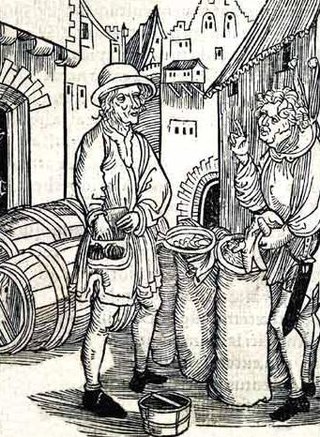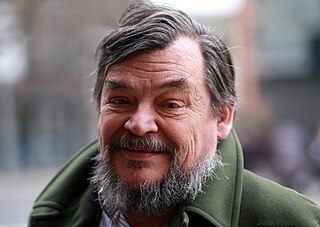Related Research Articles
The Austrian School is a heterodox school of economic thought that advocates strict adherence to methodological individualism, the concept that social phenomena result exclusively from the motivations and actions of individuals. Austrian school theorists hold that economic theory should be exclusively derived from basic principles of human action.

Scholasticism was a medieval school of philosophy that employed a critical organic method of philosophical analysis predicated upon the Aristotelian 10 Categories. Christian scholasticism emerged within the monastic schools that translated scholastic Judeo-Islamic philosophies, and thereby "rediscovered" the collected works of Aristotle. Endeavoring to harmonize his metaphysics and its account of a prime mover with the Latin Catholic dogmatic trinitarian theology, these monastic schools became the basis of the earliest European medieval universities, contributing to the development of modern science; scholasticism dominated education in Europe from about 1100 to 1700. The rise of scholasticism was closely associated with these schools that flourished in Italy, France, Portugal, Spain and England.

In finance and economics, interest is payment from a borrower or deposit-taking financial institution to a lender or depositor of an amount above repayment of the principal sum, at a particular rate. It is distinct from a fee which the borrower may pay the lender or some third party. It is also distinct from dividend which is paid by a company to its shareholders (owners) from its profit or reserve, but not at a particular rate decided beforehand, rather on a pro rata basis as a share in the reward gained by risk taking entrepreneurs when the revenue earned exceeds the total costs.

Haugesund is a municipality on the North Sea in Rogaland county, Norway. While the population is greater in the neighboring Karmøy municipality, the main commercial and economic centre of the Haugaland region in northern Rogaland and southern Vestland is in Haugesund. The majority of the population of Haugesund lives in the Haugesund urban area in the municipality's southwest. The majority of the municipality outside this area is rural or undeveloped.

Usury is the practice of making unethical or immoral monetary loans that unfairly enrich the lender. The term may be used in a moral sense—condemning taking advantage of others' misfortunes—or in a legal sense, where an interest rate is charged in excess of the maximum rate that is allowed by law. A loan may be considered usurious because of excessive or abusive interest rates or other factors defined by the laws of a state. Someone who practices usury can be called a usurer, but in modern colloquial English may be called a loan shark.

Erik Steenfeldt Reinert is a Norwegian economist, with development economics, economic history and history of economic policy as his specialties.

The School of Salamanca is the Renaissance of thought in diverse intellectual areas by Spanish theologians, rooted in the intellectual and pedagogical work of Francisco de Vitoria. From the beginning of the 16th century the traditional Catholic conception of man and of his relation to God and to the world had been assaulted by the rise of humanism, by the Protestant Reformation and by the new geographical discoveries and their consequences. These new problems were addressed by the School of Salamanca. The name refers to the University of Salamanca, where de Vitoria and other members of the school were based.
The Norwegian School of Economics or NHH is a business school situated in Bergen, Norway. It was founded in 1936 as Norway's first business school and is the leading teaching and research institution in Norway for the fields of management and business administration.
In economics, economic value is a measure of the benefit provided by a good or service to an economic agent. It is generally measured through units of currency, and the interpretation is therefore "what is the maximum amount of money a specific actor is willing and able to pay for the good or service"?

Domingo de Soto, O.P. was a Spanish Dominican priest and Scholastic theologian born in Segovia (Spain), and died in Salamanca (Spain), at the age of 66. He is best known as one of the founders of international law and of the Spanish Thomistic philosophical and theological movement known as the School of Salamanca. He is also known for his contributions to Mechanical Physics.
The history of economic thought is the study of the philosophies of the different thinkers and theories in the subjects that later became political economy and economics, from the ancient world to the present day in the 21st century. This field encompasses many disparate schools of economic thought. Ancient Greek writers such as the philosopher Aristotle examined ideas about the art of wealth acquisition, and questioned whether property is best left in private or public hands. In the Middle Ages, Thomas Aquinas argued that it was a moral obligation of businesses to sell goods at a just price.
In the history of economic thought, ancient economic thought refers to the ideas from people before the Middle Ages.
Leif Frode Onarheim was a Norwegian businessperson and politician for the Conservative Party.
Tore Olaf Rimmereid is a Norwegian businessperson.
Throughout modern history, a variety of perspectives on capitalism have evolved based on different schools of thought.
Jan Erik Langangen is a Norwegian businessperson and lawyer.
Eivinn Berg was a Norwegian diplomat and politician for the Conservative Party.
Marjorie Grice-Hutchinson MBE was an English economist.
Henry of Oyta was a German theologian and nominalist philosopher.

Stephen T. Worland was an American economist and professor at the University of Notre Dame. Worland's specialties included the history of economic thought, social economics, and welfare economics. Worland is the author of the book Scholasticism and Welfare Economics, published by the University of Notre Dame Press in 1967. He also authored the Economics and Justice chapter in the book Justice: Views from the Social Sciences, edited by Ronald L. Cohen and published by Springer in 1986.
References
- 1 2 3 4 5 Svendsen, Arnljot Strømme (2002). "Odd Langholm". In Helle, Knut (ed.). Norsk biografisk leksikon (in Norwegian). Vol. 5. Oslo: Kunnskapsforlaget. Retrieved 11 March 2009.
- 1 2 3 Henriksen, Petter, ed. (2007). "Odd Langholm". Store norske leksikon (in Norwegian). Oslo: Kunnskapsforlaget. Retrieved 11 March 2009.